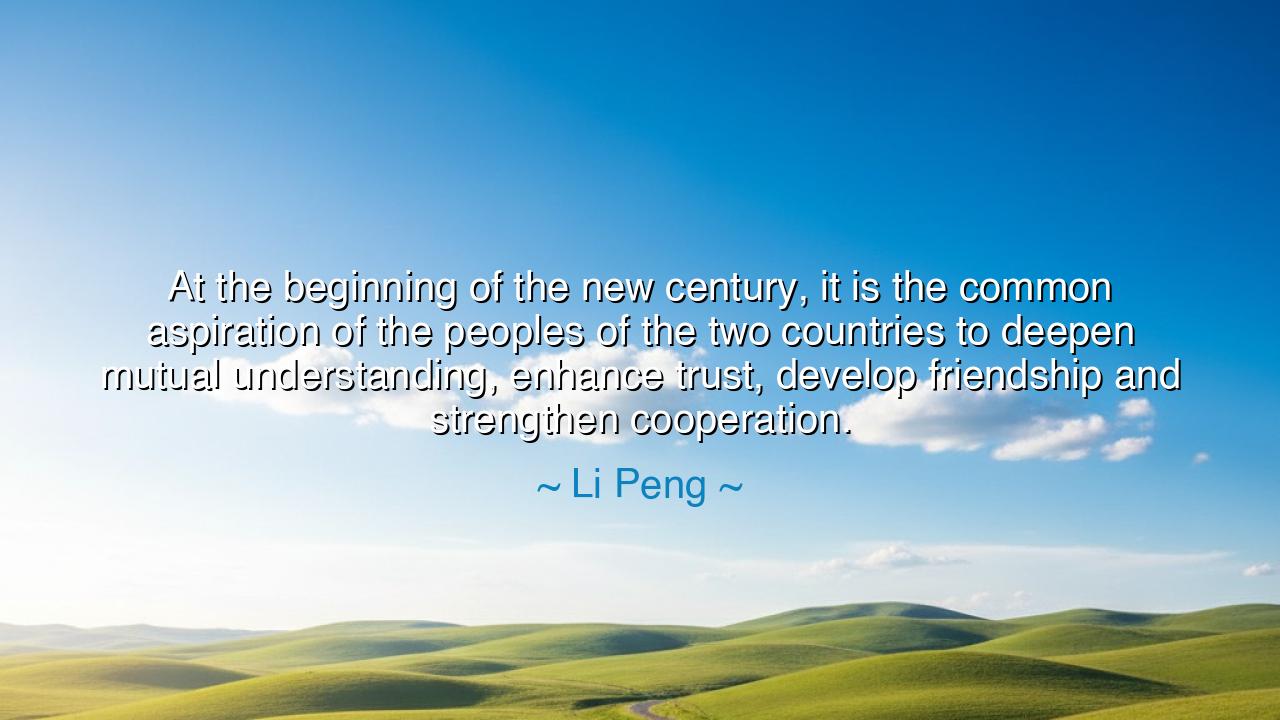
At the beginning of the new century, it is the common aspiration
At the beginning of the new century, it is the common aspiration of the peoples of the two countries to deepen mutual understanding, enhance trust, develop friendship and strengthen cooperation.






"At the beginning of the new century, it is the common aspiration of the peoples of the two countries to deepen mutual understanding, enhance trust, develop friendship and strengthen cooperation." — Li Peng
In the dawn of a new age, when the world stands on the precipice of change, the desires of nations often intertwine, creating a tapestry of aspirations and dreams. Li Peng, in his profound words, speaks of a shared hope—a desire for nations to come together in understanding, to foster trust, and to build lasting friendships. This call is not merely for the improvement of diplomatic ties, but for the strengthening of the very fabric that binds peoples together. It is a call to transcend the divisions that have marked the history of mankind and to embrace the transformative power of unity and cooperation.
To understand the depth of this aspiration, one must look to the ancient wisdom of those who believed in the strength of united peoples. The great Greek philosopher Aristotle understood the importance of friendship between cities and nations. He believed that true peace could only be achieved when mutual understanding was established and when nations no longer viewed one another as adversaries, but as partners in the grand journey of human existence. In his vision, the world was a collective body, and each nation, like a limb, contributed to the whole. If one part faltered, the entire body would suffer. In this light, Li Peng’s call for strengthening cooperation is not simply political rhetoric; it is a call for the survival and flourishing of humanity.
History is full of examples of the power of cooperation born from mutual understanding. Consider the relationship between China and the United States in the aftermath of the Cold War. The early years of the 21st century marked a significant turning point, as both nations, recognizing their interconnectedness in the global economy and geopolitical landscape, sought to build a relationship based not on fear, but on shared interests. Diplomacy flourished as both nations realized that to secure peace and prosperity for their peoples, they must first understand one another’s values, goals, and challenges. Trust, while difficult to build, began to form through engagement and open dialogue, laying the foundation for cooperation on trade, security, and global issues.
The words of Li Peng also call us to remember the heroic alliances formed in times of adversity. The Allied Powers during the Second World War, though coming from vastly different backgrounds, cultures, and ideologies, found strength in their cooperation. The very foundation of their victory lay not in the dominance of one, but in the collective will to overcome a common enemy. Their ability to understand and trust one another, to see beyond their differences, was the key to their success. This shared cooperation resulted in the creation of institutions like the United Nations, meant to foster global understanding and peace.
Yet, the journey toward mutual understanding, trust, and friendship is not without its challenges. It is far easier to remain in our isolated corners, clinging to our old biases and misconceptions, than to reach out to others, to listen and learn from those whose experiences differ from our own. Li Peng’s call reminds us that it is through cooperation, through the willingness to understand the other, that we can overcome the forces that divide us. To build trust, we must act not from suspicion or fear, but from a place of hope and respect. This is not a journey for the faint-hearted but for those with the courage to step beyond the barriers that have been built by history, ideology, and pride.
The lesson here is profound: the world’s greatest challenges cannot be overcome by one nation alone. The future of humanity lies not in isolated effort, but in the collective strength that arises when we come together in mutual understanding. Friendship, whether between individuals or nations, is not born out of convenience, but out of the shared recognition of each other's inherent dignity and worth. Trust is the cornerstone of this friendship, and it is built through honesty, openness, and a willingness to listen to what the other has to say.
Therefore, as we walk into the future, let us take Li Peng’s words to heart. Let us choose to deepen our understanding of those around us, not merely as neighbors, but as fellow travelers on this great journey of life. Let us enhance trust by acting with integrity and goodwill, always seeking to uplift rather than divide. Let us not view differences as obstacles, but as opportunities for growth and learning. And in doing so, let us strengthen cooperation—not just between nations, but in our daily lives, in our communities, and in our hearts. For it is through these actions that we build a future worthy of the shared aspirations of all peoples.






AAdministratorAdministrator
Welcome, honored guests. Please leave a comment, we will respond soon